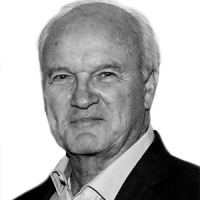There is a graveyard in Massachusetts that stretches a bit over 100 miles in length, a permanent reminder of why so many of these preposterous political experts sit, stunned, by the success of Donald Trump and Bernie Sanders. It’s called Route 2, a highway that begins in Boston and ends at the New York border.
In last week’s presidential primary both Hillary Clinton and John Kasich did well in towns and cities along the first 25 miles from Boston through the relatively affluent western suburbs. Here, the economic base is in high-tech, bio-tech, financial services, medical, and education jobs.
Family income is above average. Employment is high. School systems, a draw to young parents. The commute, manageable. Hospitals, ballparks, museums, shopping malls, parks, playgrounds, golf courses, libraries, thriving town business districts, all easily accessible from Cambridge out through history’s bookends like Lexington and Concord.
Then, the landscape changes. Thirty miles from Harvard Square there is a snapshot of other locations where frustration, fear, anxiety about the present, anger about the past, and apprehension about the immediate future collide with voter rage against the machine of professional politics that has left so many either behind or at the margin of American life.
Now, in small towns like Shirley and Ayer, medium-size cities like Fitchburg and Gardner, rural enclaves like Gardner and Winchendon—all just 40, 50, 60 miles from the prosperity around metro Boston there are carbon copies of parts of Ohio, western Pennsylvania, West Virginia, Indiana, downstate Illinois and other areas gutted by trade agreements like NAFTA, stunted, perhaps permanently, by wage stagnation, threatened by the out migration of children who see nothing but darkness in the future of the hometowns where their parents struggled mightily to raise families.
There are places in this 100-mile cemetery where the headstones are simple, stark reminders of decades of job loss. This is the land of the forgotten. And this is where Trump and Sanders thrive at the polling booth, one of the last places where people can vent their hostility to politicians who have abused them with neglect for decades.
Their resentment began a half century ago when the paper mills and textile plants left for non-union states in the South, well before they found an even softer and more profitable landing in China, Vietnam, and India. Then the machine shops, the tool and die jobs, the plastic factories, and General Electric hit the road, leaving old pay stubs as a reminder of what used to be.
Resentment soon became rage as a feeling of abandonment and hopelessness gained a firm foothold. A good job, if one could be found, was no longer down the street or across town or a 15-minute drive. The lives so many had lived for generations disappeared.
Here, the main streets of cities like Fitchburg and Gardner resemble ghost towns at mid-day of a normal workweek. Welfare rolls increase. Medical insurance premiums are prohibitive for too many. Manufacturing jobs are replaced by part-time work in fast-food franchises. Union carpenters can have a 50- or 60-mile round trip to work.
This is not the Massachusetts labeled as “all-liberal-all the time” by pundits and professors. This is the state of too much of this nation; a region where the rantings of the Tea Party had a built-in audience, eager to act against any established political order. Rebellion has its roots in government’s indifference and incompetence. The social compact was fractured long before the economic collapse of 2008.
In places like many of the cities and towns along Route 2 heading west, job loss and wage stagnation have been a fact of life for at least 30 years. Take a look at any color-coded voting map of last week’s primaries in Massachusetts and you will see an entire region that had been waiting for a Trump or a Sanders to show up with a vehicle ready-made for the forgotten to drive home a point to a political system uniquely incapable of addressing the lives, income, and optimism lost.
Two different states of mind. Two different countries. One that caters to those with good educations, who live in affluent ZIP Codes, who were certainly hurt in the collapse of 2008 but not left for dead. The other, a majority, mere roadkill. Already crushed, too many were pushed to the edge of a cliff, left with a paycheck-to-paycheck existence… if they were lucky enough to have employment at all.
And this asphalt cemetery extends from coast to coast, north to south, with off ramps that often lead to a dead-end existence. The middle-class ladder has rungs that no longer exist for many trying to climb higher. Instead, for too many, in too many places, their chore is simply trying to hang on.
Trump, with all his flaws and false promise, speaks to this audience. Sanders, with his imperfect proposals and genuine, lifelong belief in equity, is heard here loud and clear. Their success is no mystery.
The sadness within the American promise is that in places where voices are not heard, where dreams are now nearly dead, where a generation of hard work and solid wages have been hollowed out or stolen as the establishment sat on its hands unwilling to fight an economic system geared to satisfying shareholders before addressing the real needs of families that once thought they were on a level playing field, the future is now filled with dread instead of a dream.
So here, along this one, long road in Massachusetts, is the root of the 2016 revolution that has so many “experts” sitting in stunned amazement. But it’s been in front of us for a long, long time. It’s hard to have seen it though when the eyes and ears of so many have been closed for decades.






